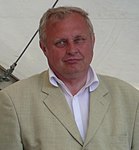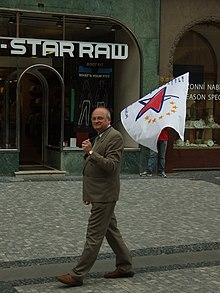
The Civic Democratic Party is a conservative and Eurosceptic political party in the Czech Republic. The party sits centre-right to right-wing on the political spectrum, and holds 34 seats in the Chamber of Deputies, and is the second strongest party by number of seats following the 2021 election. It is the only political party in the Czech Republic that has maintained an uninterrupted representation in the Chamber of Deputies.
The 2004 European Parliament election in the Czech Republic was the election of members of the European Parliament (MEPs) representing the Czech Republic for the 2004–2009 term of the European Parliament. It was part of the wider 2004 European election.

Parliamentary elections were held in the Czech Republic on 19 and 20 June 1998. The Czech Social Democratic Party emerged as the largest party, winning 74 of the 200 seats. Voter turnout was 73.9%.
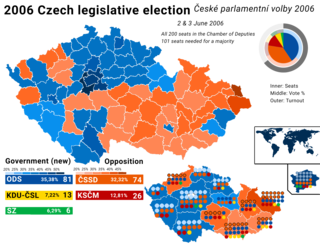
Parliamentary elections were held in the Czech Republic on 2 and 3 June 2006 to elect the members of the Chamber of Deputies.

Parliamentary elections were held in the Czech Republic on 28–29 May 2010 to elect the 200 members of the Chamber of Deputies. The elections had been expected to take place sometime before the end of 2009, but was postponed due to legal challenges. Before the election, the country had been governed by a caretaker administration headed by Jan Fischer. The Czech Social Democratic Party (ČSSD) was the front-runner of the election and its leader Jiří Paroubek was the favourite to become the new Prime Minister.
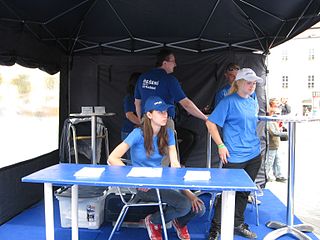
In Czech politics, the Blue Team was a members organisation of the Civic Democratic Party (ODS), whose purpose, as stated on its website, was to help at ODS meetings, promote right-wing political ideas, promote the team itself, analyse opinion polls, and recruit new members.

Early parliamentary elections were held in the Czech Republic on 25 and 26 October 2013, seven months before the constitutional expiry of the elected parliament's four-year legislative term.

The 2012 Regional Council Elections were held on the 12th and 13th of October in all administrative regions of the Czech Republic, with the exception of Prague. The election was won by the Czech Social Democratic Party (ČSSD), which received the most votes in 9 of the 13 regions despite experiencing a significant drop in voter share overall.

Presidential elections were held in the Czech Republic in January 2013, the country's first direct election for the presidency. No candidate received a majority of the votes in the first round on 11–12 January, so a second round runoff election was held on 25–26 January. Nine individuals secured enough signatures or support of parliamentarians to become official candidates for the office. Miloš Zeman of the Party of Civic Rights (SPOZ) and Karel Schwarzenberg of TOP 09 qualified for the second round, which was won by Zeman with 54.8% of the vote, compared to Schwarzenberg's 45.2%. Zeman assumed office in March 2013 after being sworn in.

European Parliament elections were held in the Czech Republic on 23 and 24 May 2014. In total, 21 Members of the European Parliament were elected using proportional representation.
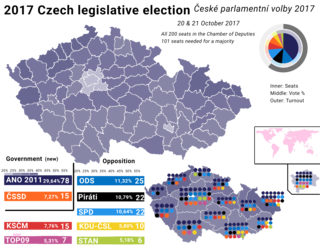
Parliamentary elections were held in the Czech Republic on 20 and 21 October 2017. All 200 members of the Chamber of Deputies were elected and Andrej Babiš of ANO 2011, also the leader of the resultant government, became the Prime Minister. The coalition government following the 2013 parliamentary elections consisted of the two largest parties: the Czech Social Democratic Party (ČSSD) of Prime Minister Bohuslav Sobotka, and ANO 2011 (ANO), led by former Finance Minister and businessman Andrej Babiš, alongside the Christian and Democratic Union – Czechoslovak People's Party (KDU–ČSL). The largest opposition party was the Communist Party of Bohemia and Moravia (KSČM), followed by centre-right parties TOP 09 and the Civic Democratic Party (ODS).

The 2010 Prague municipal election was held as part of 2010 Czech municipal elections. It was held on 15 and 16 October 2010. Prague was divided into 7 electoral districts with 9 mandates allocated for each district. It created a "natural threshold."

Plzeň municipal election in 2014 was held as part of 2014 Czech municipal elections. It was held on 10 and 11 October 2014. ANO 2011 received the highest number of votes but Civic Democratic Party (ODS) and Czech Social Democratic Party (ČSSD) won the same number of seats in the City's assembly. Civic Democratic Party ruled in Plzeň more than 20 years but was expected to lose its positions and receive only 10% of votes. In an electoral upset, ODS received more than 17%. Leader of local Civic Democrats Martin Baxa said that he believes that ODS was the actual victor of the election. Voter turnout was 33.73%.
Czech political crisis in 1997–1998 started as a result of irregularities in finances of Civic Democratic Party (ODS). It peaked with so-called Sarajevo atentate, an attempt to remove Václav Klaus from leadership of Civic Democratic Party. The attempt occurred during Klaus' visit in Sarajevo. Crisis led to split in ODS and snap election in 1998.

The 1998 Prague municipal election was held as part of 1998 Czech municipal elections. Civic Democratic Party has received highest number of votes and formed coalition with Czech Social Democratic Party. Jan Kasl became mayor of Prague.

The 2018 Prague municipal elections were held in Prague in on 5 and 6 October 2018 as part of nationwide municipal elections. All 65 seats of the Prague Assembly were up to elect. Full results were presented a day later, on 7 October 2018.

Senate elections were held in the Czech Republic on 5 and 6 October 2018 alongside municipal elections, with a second round held on 12 and 13 October 2018. The Conservative Civic Democratic Party (ODS) won the election with 10 seats. Governing parties ANO 2011 and the Czech Social Democratic Party were heavily defeated, winning only 1 seat each. The Communist Party lost its last seat in the Senate when Václav Homolka failed to be re-elected, meaning the party would be without representation in the Senate for the first time in the history of Czech Republic. The election was considered the first major win for the opposition to Andrej Babiš' Cabinet. Commentators including Josef Kopecký also noted ODS confirmed their position as the main opposition party, ahead of the Czech Pirate Party.
The 2019 European Parliament election in the Czech Republic was held on 24 and 25 May 2019, electing the 21 members of the Czech delegation to the European Parliament as part of the European elections held across the European Union.

Elections were held in the Czech Republic from 7 to 8 June 2024 to elect 21 Czech representatives for the European Parliament, alongside the EU-wide 2024 European Parliament election. This was the fifth parliamentary election since the Czech Republic's EU accession in 2004, and the first to take place after Brexit.

Elections to regional councils in the Czech Republic in 13 regions were held on 2–3 October 2020.



